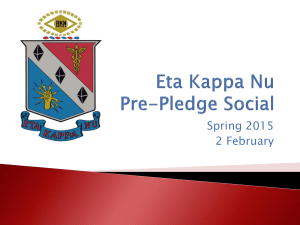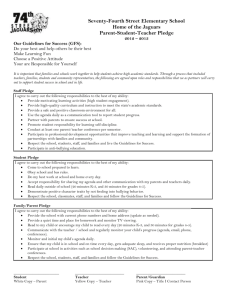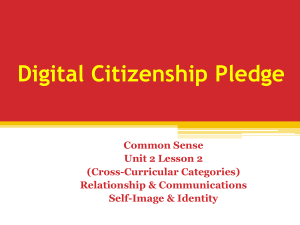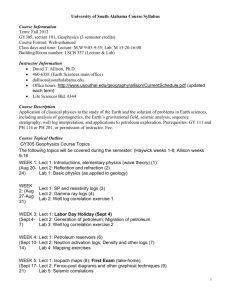BSCI 205 - University of Maryland
advertisement
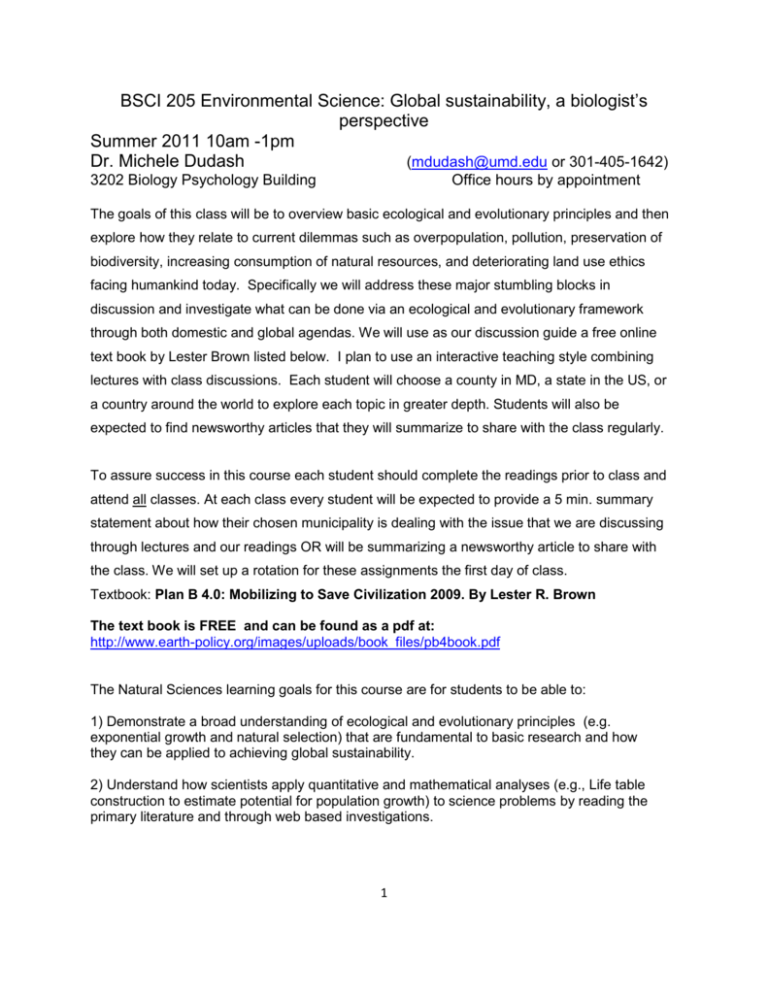
BSCI 205 Environmental Science: Global sustainability, a biologist’s perspective Summer 2011 10am -1pm Dr. Michele Dudash (mdudash@umd.edu or 301-405-1642) 3202 Biology Psychology Building Office hours by appointment The goals of this class will be to overview basic ecological and evolutionary principles and then explore how they relate to current dilemmas such as overpopulation, pollution, preservation of biodiversity, increasing consumption of natural resources, and deteriorating land use ethics facing humankind today. Specifically we will address these major stumbling blocks in discussion and investigate what can be done via an ecological and evolutionary framework through both domestic and global agendas. We will use as our discussion guide a free online text book by Lester Brown listed below. I plan to use an interactive teaching style combining lectures with class discussions. Each student will choose a county in MD, a state in the US, or a country around the world to explore each topic in greater depth. Students will also be expected to find newsworthy articles that they will summarize to share with the class regularly. To assure success in this course each student should complete the readings prior to class and attend all classes. At each class every student will be expected to provide a 5 min. summary statement about how their chosen municipality is dealing with the issue that we are discussing through lectures and our readings OR will be summarizing a newsworthy article to share with the class. We will set up a rotation for these assignments the first day of class. Textbook: Plan B 4.0: Mobilizing to Save Civilization 2009. By Lester R. Brown The text book is FREE and can be found as a pdf at: http://www.earth-policy.org/images/uploads/book_files/pb4book.pdf The Natural Sciences learning goals for this course are for students to be able to: 1) Demonstrate a broad understanding of ecological and evolutionary principles (e.g. exponential growth and natural selection) that are fundamental to basic research and how they can be applied to achieving global sustainability. 2) Understand how scientists apply quantitative and mathematical analyses (e.g., Life table construction to estimate potential for population growth) to science problems by reading the primary literature and through web based investigations. 1 3) Appreciate the complexity of solving scientific challenges involved with achieving global sustainability in the context of both the local and global political, social, ethical, and economic constraints. 4) Critically evaluate scientific data to both understand the limits of scientific knowledge and to hypothesize what information is needed next to address a scientific challenge in achieving global sustainability, and to apply this critical evaluation in the context of in class group discussions throughout the semester and by preparing a final paper. 5) Communicate their mastery of these skills by presenting to their peers a final project in which they address a specific scientific problem, compile the data currently available, assess the limits of scientific knowledge on this topic, and propose ideas for future scientific research. Class Schedule May 31 June 1 June 2 Introduction to the course: Country choices by students Lect. 1 Introduction to Ecology and Plan 4.0B Lect. 2 Ecosystem Function Disc. 1 *Chap. 1: Selling our Future – overview Lect. 3 Community Ecology Challenges: June 3 Disc. 2 *Chap. 2: Population Pressure- Land & water limitations Lect. 4 Population Ecology Disc. 3 *Chap. 3: Climate Change and Energy Transition Review for exam 1 June 6 Exam 1 100 points: Lectures and Discussions 1-3 Disc. 4 Response: *Chap. 4: Stabilizing climate, energy efficient revolution June 7 June 8 Lect. 5 Population Ecology – A mathematical approach Disc. 5 *Chap. 5: Shifts to renewable energy Lect. 6 Natural, Artificial and Sexual selection Disc. 6 *Chap. 6: Designing cities for people 2 June 9 Lect. 7 Artificial Selection to alleviate world food crisis: The role of genetic modification to feed the planet June 10 Disc. 7 *Chap. 7: Eradicating poverty & stabilizing population growth Lect. 8 Preservation of Biodiversity: Conservation and Restoration Disc. 8 *Chap. 8: Restoring the Earth Review for exam 2 June 13 Exam 2 100 points: Lectures and Discussions 4-7 Catch up time for Lecture material and Discussions Preparation information for final presentations and annotation packets June 14 June 15 Lect. 9 Preservation of Biodiversity: Role of speciation? Disc. 9 *Chap. 9: Feeding 8 billion people well Lect.10 Achieving a balance: Global ecology and societal pressures Disc. 10 *Chap. 10: The Great Mobilization June 16 Student Presentations (Hand in Critical Annotation packet, n=9) Review for final exam June 17 Student Presentations Exam 3 100 points: Lectures and Discussions 8-10 Grading: 3 essay based exams with each worth 100 points = 300 points Oral power point presentation = 60 points *Discussion = 10 points/9 classes plus 20 points as a discussion leader = 110 points Annotation of 10 PEER REVIEWED (can access search engines through Research Port at UMD library site) research articles along with an Abstract summarizing your major findings from all references related to your individual target populations @10 pts each = 110 pts. The prompt is: Annotate each article with respect to the overarching goals of Plan 4.0B: 1) Stabilize population growth, 2) Eradicate poverty, 3) Restore the earth natural support system, and 4) Stabilize climate. Please also list the complete reference for each article in a standard format such that I am readily able to locate it through the library reference system. EXAMPLE: Dudash, M. R., C. Hassler, P. Stevens and C. B. Fenster. 2011. Experimental floral and inflorescence trait manipulations affect pollinator preference and function in a hummingbird pollinated plant. American Journal of Botany 98:275-282. Course Total = 580 points with A >90%, B > 80%, C > 70%, D > 60% and F < 60% 3 • Academic Accommodations: If you have a documented disability, you should contact Disability Support Services in Susquehanna Hall (301- 314-7682). Each semester students with documented disabilities should apply to DSS for accommodation request forms which you can provide to your professors as proof of your eligibility for accommodations. The rules for eligibility and the types of accommodations a student may request can be reviewed on the DSS web site at http://www.counseling.umd.edu/DSS/receiving_serv.html. • Religious Observances: The University System of Maryland policy provides that students should not be penalized because of observances of their religious beliefs, students shall be given an opportunity, whenever feasible, to make up within a reasonable time any academic assignment that is missed due to individual participation in religious observances. It is the responsibility of the student to inform the instructor of any intended absences for religious observances in advance. Notice should be provided as soon as possible but no later than the end of the schedule adjustment period. Faculty should further remind students that prior notification is especially important in connection with final exams, since failure to reschedule a final exam before the conclusion of the final examination period may result in loss of credits during the semester. The problem is especially likely to arise when final exams are scheduled on Saturdays. • Academic integrity: The University of Maryland has a nationally recognized Code of Academic Integrity, administered by the Student Honor Council. This Code sets standards for academic integrity at Maryland for all undergraduate and graduate students. As a student you are responsible for upholding these standards for this course. It is very important for you to be aware of the consequences of cheating, fabrication, facilitation, and plagiarism. For more information on the Code of Academic Integrity or the Student Honor Council, please visit http://www.studenthonorcouncil.umd.edu/whatis.html The University of Maryland is one of a small number of universities with a studentadministered Honors Code and an Honors Pledge. The code prohibits students from cheating on exams, plagiarizing papers, submitting the same paper for credit in two courses without authorization, buying papers, submitting fraudulent documents, and forging signatures. The University Senate encourages instructors to ask students to write the following signed statement on each examination or assignment: "I pledge on my honor that I have not given or received any unauthorized assistance on this examination (or assignment).” University’s Code of Academic Integrity: http://www.jpo.umd.edu Honor Pledge 1. On every examination, paper or other academic exercise not specifically exempted by the instructor, the student shall write by hand and sign the following pledge: I pledge on my honor that I have not given or received any unauthorized assistance on this examination. Failure to sign the pledge is not an honors offense, but neither is it a defense in case of violation of this Code. Students who do not sign the pledge will be given the opportunity to do so. Refusal to sign must be explained to the instructor. Signing or non-signing of the pledge will not be considered in grading or judicial procedures. Material submitted electronically should contain the pledge; submission implies signing the pledge. 2. On examinations, no assistance is authorized unless given by or expressly allowed by the instructor. On other assignments, the pledge means that the assignment has been done without academic dishonesty, as defined above. 3. The pledge is a reminder that at the University of Maryland students carry primary responsibility for academic integrity because the meaningfulness of their degrees depends on it. 4
